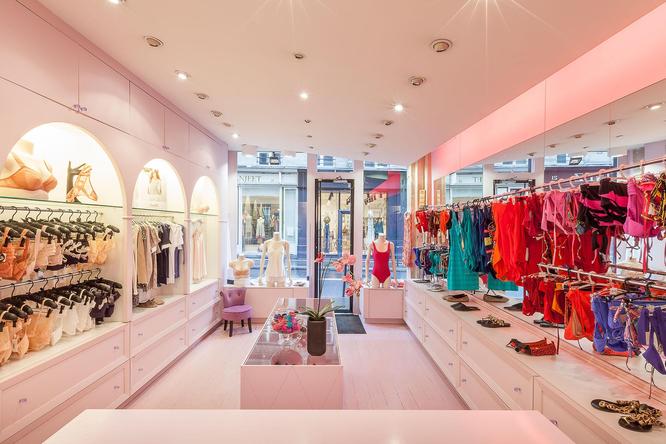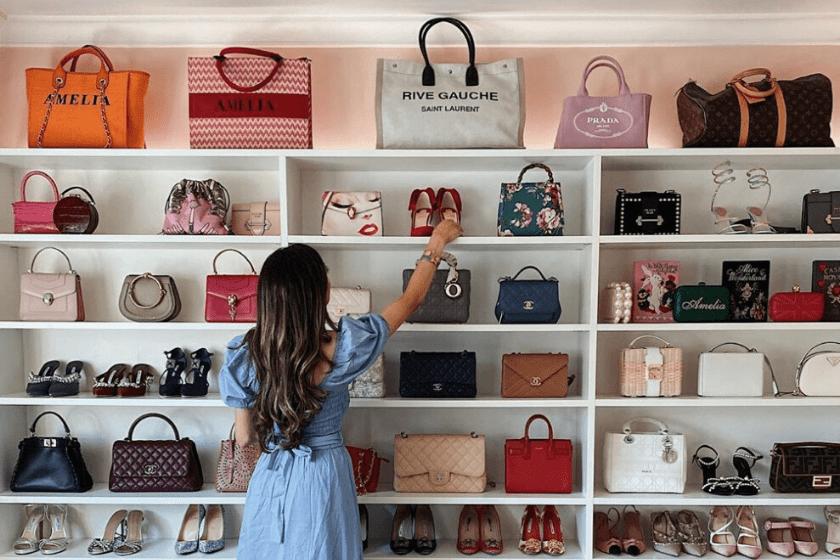The Moroccan madness of empty dressing rooms: luxury at second hand

aA
When it comes to shopping for luxury items in Morocco, there is now a before and an after. Before the establishment of the Morocco Mall, and the proliferation of luxury boutiques on the Casablanca-Rabat axis, the Moroccan bourgeoisie used to shop elsewhere. In France for the majority of the wealthy, in Italy or the United States for others… That time is now over…or almost.
Today, in Rabat or Casablanca, the offer offered by the big brands more or less manages to satisfy the expensive and specialized desires of a clientele looking for current trends. Similarly, in the old medina of Casablanca, the best brand imitations have continued to be offered for decades. Gucci, Louis Vuitton, Prada, Dior… in Morocco, we identify ourselves from head to toe whether we live in Anfa Sup' or Hay Mohammedi.
Luxury, or at least the impression of luxury, we like that, even if it means adorning ourselves with counterfeit articles or acquiring second-hand articles, less expensive and in good condition.
Behind the scenes of a Casablanca dressing room sale
Once every two months, SR organizes a private sale of second-hand luxury ready-to-wear items in his apartment. A used Gucci bag at 500 dhs, a pair of Valentino at 2000 dhs, a Dior coat at 3000 dhs, a Joseph jacket at 1500 dhs… In his small studio in Casablanca, you can find everything in terms of luxury items and for everyone. the prices. On the authenticity side, there is no question. Only the word of SR, this inveterate fashionista, recognized as the popess of style in a certain microcosm of Casablanca, is enough to overcome all reluctance. When she declares sure of herself to her clients “my darling, this Gucci bag is made for you! You can't miss it”, or even “authentic? but of course, who do you take me for?”… We readily believe her and rush on it, ignoring the rest because when it comes to fashion, the word of a connoisseur is golden.
To furnish her studio converted into a showroom, SR just needs to activate her network, wink at those around her, rummage through her girlfriends' cupboards to unearth the salable pieces that she will make desirable thanks to her sales pitch. well-groomed fashionista. For it to work, it is necessary to display very affordable prices, with discounts sometimes going up to -90% of the original price on which the good seller that she is punctures a commission.
For it to work, you have to know how to find the right customers, those who will fall for the most expensive items, those who don't really have the means but who are regular. Finally, the ultimate secret to success, handpicking your clients. Do not come here who wants! We make sure to invite the influencers of the city. Not the ones that are rampant on instagram, especially not! But rather those who, as teenagers, were the star girls of the schoolyard and who, once they have become adults, continue to shine in society for the same obscure reasons. In this vacuum-dressing room, the customers know each other at least by sight, by name, by reputation and they therefore buy to do like the other, to spend more than the other and to be part of a sort of closed club of stylish girls who love vintage.
The term vintage is very important here, because not everyone assumes the fact of wearing second-hand clothing. So to give yourself a clear conscience and assume it, you declare yourself a “vintage” lover.
© Copyright: DRSR's clientele is extremely varied. Among the faithful buyers of this vacuum-dressing room, we find Yasmine, who works in a com agency. She has a salary of 20,000 dirhams per month. Enough to live very decently in Casablanca without being able to afford follies. His problem ? Its limited financial capacity to be able to acquire branded clothing. She could certainly be satisfied with brands that are rather accessible for her budget, but dressing in Zara, Massimo Dutti, üterque or Banana Republic is still okay provided she displays one or two luxury pieces. Impossible for her to acquire a Dior bag that displays the price of budget accommodation. So what to do? This is where the magic of empty dressing rooms takes place… Yasmine does not miss this appointment under any circumstances. Armed with her checkbook, she spends between 5,000 and 10,000 dirhams each quarter on bags, shoes or it-pieces that will give style and value to a basically basic outfit.
Here, we also find Leila, a young entrepreneur who is embarking on the world of business and who, in order to impress her prospects with an image of a woman who has succeeded even before having started, has opted for the technique of: "putting on the table meeting a bag and designer glasses".
“It immediately sets the tone,” she explains to us. We are not impressed in the same way by a person who drives a Dacia or a Range Rover. Same in terms of fashion. The value of what we display imposes a form of respect. Of course, for this type of customer, it is out of the question to tell anyone that the item was purchased second-hand.
Shopping 2.0, a wild west without faith or law
The digitization of Moroccan society has allowed the concept of the empty-dressing room to disembodie itself and reach the masses, those who are not necessarily invited to a vacuum-dressing room. Following in the footsteps of the United States, a pioneer country in terms of e-commerce of second-hand luxury items, Morocco has surfed the wave of the web to develop this very lucrative business but in its own way...
Because if dressing rooms 2.0 are highly regulated elsewhere, here the digital world is a real farwest with no rules to follow or respect. Narjiss Mossadak, founder of jeshop.ma is the first in Morocco to have decided to invest in this niche by putting the forms in it and applying the law and procedures to the letter. Daughter of the administration, her motto could be "we don't mess with the law". Fashion lover, while hating shopping in the pompous world of luxury boutiques in Morocco, she decided to set up a web platform that will take care of intermediation between sellers and buyers. On its site, there are articles of the same ilk as in SR's empty-dressing room, but with a real concern for authentication. Narjiss does not allow articles that do not show their credentials to be posted on its platform. You have to be able to provide proof with a purchase invoice, a certificate of authenticity and when this is not possible, she calls on her small network of experts to authenticate the item in question. A laudable step which however struggles to establish itself in Morocco in the face of the most unfair competition.
© Copyright: DR

The digitization of shopping has as many advantages as disadvantages. Indeed, if this young entrepreneur has put all her capital and energy into her website and is bleeding through her fingers to pay and declare her small team and her taxes, she must face the ravages of counterfeiting and the black market which are rampant on social media.
On Instagram, accounts titled vide-dressing are legion across Morocco. Most offer the same thing: second-hand luxury items, with no guarantee of authenticity, sold at affordable prices. No need for a website, team or company… Just open an Instagram account, post photos of so-called luxury items, a short comment mentioning the brand and the price, all washed down hashtags and you're done. All you have to do is wait for it to bite. For transactions, we negotiate via the private messaging of the social network and when the thing is confirmed, we exchange telephone numbers to concretize the sale for the sum in cash or a check to the bearer and arrange the delivery. Neither seen nor known.
The means of payment represents the sinews of war. Buyer side and seller side, we often put up with non-traceable transactions. A wound for our young entrepreneur who advocates and imposes the traceability of payments, which is not always easy for customers to hear, but which is nevertheless a sine qua none condition for the users of her platform. Finally, the impossibility of practicing payment in installments by cheque, an illegal practice, therefore makes competition even fiercer with unscrupulous sellers.
Behind these accounts, mostly individuals, some of whom have a stable job and who make ends meet by doing intermediation. This is the case of Siham who works as a collection manager in a company. Having some contacts in Italy and the United States, she regularly receives luxury items from elsewhere, declawed or fake, and at unbeatable prices that she then hastens to put up for sale on an Instagram account. "My bank account is better stocked than my boss's," she laughs.
Other profiles of illegal sellers who rage on the web, the "personal shoppers", a new profession very fashionable in Morocco. Under other skies, one uses the services of a personal shopper when one is a celebrity or a VIP who has neither the time nor the desire to do their shopping. We then entrust our wallet to a qualified person who will take care of dressing us according to the trends, our tastes and our desires.
But in Morocco, this job incorporates some variations. To appeal to a personal shopper, head to Instagram once again where profiles abound. The buyers are Moroccan, they live abroad or have the opportunity to go there often. Their method is very simple. They go window shopping by filming items available in stores, preferably in outlets that offer end of series at reduced prices, and offer their virtual community to buy them the item they like for a commission, equivalent to the tax refund…
All you have to do is send him the agreed sum to his bank account in Morocco. Once the sum has been received, she buys the article in question and sends it to her client through the postal network.
Who buys, who sells? ?
Moroccan customers are quite conservative in their way of buying. We like to touch, feel, try before taking the plunge into acquisition. It is therefore necessary to be able to show the product to the potential customer before making a sale. This is the reason why Narjiss Mossadak has decided to invest soon in a physical showroom to be able to give substance to its website.
On the advantages side, the digital dressing room is especially the happiness of the saleswomen and this for many reasons that we understand by detailing their profiles.
On the one hand, the 40-year-old, from a very well-to-do social class, who does her shopping in the city's luxury boutiques every three months, with an average budget of 300,000 dirhams. The problem with this? Her cupboard overflowing and crumbling under the weight of her insatiable cravings for novelties. For her, it is not a question of selling to make money but rather to make space in her home. She also sells at all prices, without any real strategy, setting her prices according to her favorites.
© Copyright: DROn the sales side, there is also the woman who has just been divorced or who has suffered a financial setback and who to compensate for it sells her most expensive clothes or her jewellery.
There are also, much rarer, sharp fashionistas who are looking for “vintage” pieces that can no longer be found in stores and who put some of their items up for sale to buy others.
All have one thing in common: they value their anonymity, something that online sales bring them.
- Prev
- Next







